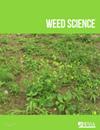Allelopathic effects of aqueous extracts from uncomposted and composted Mexican devel (Ageratina Adenophora) plants on forest fungal growth and soil nitrogen and phosphorus mobilization
IF 2.5
2区 农林科学
Q2 AGRONOMY
引用次数: 0
Abstract
Abstract Mexican devil [ Ageratina adenophora (Spreng.) R.M. King & H. Rob.], a globally invasive weed with destructive effects on forests, has spread to numerous countries. To elucidate the inhibition of tree growth by A. adenophora , a study was conducted using the fungi ( Lactarius deliciosus , Ceriporia lacerat and Fomitopsis palustris ) involved in the recycling of carbon and nutrients in forests. The focus was on investigating soil nitrogen and phosphorus availability, in response to aqueous extracts from uncomposted and aerobically composted A. adenophora (EUA and ECA, respectively). The samples of CA from different sites exhibited a significant reduction in the concentration of allelochemicals 4,7-dimethyl-1-(propan-2-ylidene)-1,4,4a,8a-tetrahydronaphthalene-2,6(1H, 7H)-dione and 6-hydroxy-5-isopropyl-3,8-dimethyl-4a,5,6,7,8,8a-hexahydronaphthalen-2(1H)-one. This reduction more than 94% when compared to the concentration of these allelochemicals in CA. The EUA solutions at 5.0 and 10 mg L -1 (oven-dried plant biomass base) minimized Lactarius deliciosus and Ceriporia lacerate growth, and significantly decreased Fomitopsis palustris growth on the soil surface and within the soil. However, soil with ECA had no effect or promoting effect on the fungal growth. Compared to CK (only fungal inoculation in tested soil), the EUA solution reduced soil nitrogen and phosphorus, while ECA had the opposite effect; soil pH was increased by 0.01-0.08 under EUA treatment, while decreased by 0.5-0.41under ECA treatment. Nitrogen and phosphorus availability were positively correlated with protease and phosphatase activity ( r = 0.723-0.944), while available phosphorus was inversely correlated with pH in tested soils ( r = -(0.809-0.978)). As such, the EUA solution decreased soil nitrogen and phosphorus supplies by inhibiting the liberation of proteases, phosphatases, and protons, which may lead to poor growth or even mortality of three fungal species. The in situ aerobically composted A. adenophora residues left may directly supply fungal specie with nutrients and indirectly increase soil nutrient availability via the promotion of nitrogen and phosphorus mobilization.未堆肥和堆肥墨西哥青叶草(Ageratina Adenophora)植物水提物对森林真菌生长和土壤氮磷动员的化感作用
墨西哥魔鬼[Ageratina adenophora (spring .)]R.M.金&;h·罗布。],一种对森林具有破坏性影响的全球性入侵杂草,已经蔓延到许多国家。为了阐明a . adenophora对树木生长的抑制作用,利用参与森林碳和养分循环的真菌(Lactarius deliciosus、Ceriporia lacerat和Fomitopsis palustris)进行了研究。重点是调查土壤氮和磷的有效性,对未堆肥和好氧堆肥的水提取物(分别为EUA和ECA)的响应。不同位点的CA样品中化感化学物质4,7-二甲基-1-(丙-2-乙基)- 1,4,4,4a,8a-四氢萘-2,6(1H, 7H)-二酮和6-羟基-5-异丙基-3,8-二甲基-4a,5,6,7,8,8a-六氢萘-2(1H)- 1的浓度显著降低。与这些化感化学物质在CA中的浓度相比,减少了94%以上。5.0和10 mg L -1(烘干植物生物量基础)的EUA溶液使deliciosus和Ceriporia lacerate的生长最小化,并显着降低了土壤表面和土壤内部的Fomitopsis palustris的生长。而加ECA的土壤对真菌生长没有影响或促进作用。与CK(只接种真菌)相比,EUA溶液降低了土壤氮和磷,而ECA则相反;EUA处理使土壤pH升高0.01 ~ 0.08,ECA处理使土壤pH降低0.5 ~ 0.41。土壤氮、磷速效与蛋白酶、磷酸酶活性呈正相关(r = 0.723 ~ 0.944),速效磷与pH呈负相关(r = - 0.809 ~ 0.978)。因此,EUA溶液通过抑制蛋白酶、磷酸酶和质子的释放,减少了土壤氮和磷的供应,这可能导致三种真菌生长不良甚至死亡。原位好氧堆肥后留下的青霉残渣可直接为真菌提供养分,并通过促进氮、磷的动员间接增加土壤养分有效性。
本文章由计算机程序翻译,如有差异,请以英文原文为准。
求助全文
约1分钟内获得全文
求助全文
来源期刊

Weed Science
农林科学-农艺学
CiteScore
4.60
自引率
12.00%
发文量
64
审稿时长
12-24 weeks
期刊介绍:
Weed Science publishes original research and scholarship in the form of peer-reviewed articles focused on fundamental research directly related to all aspects of weed science in agricultural systems. Topics for Weed Science include:
- the biology and ecology of weeds in agricultural, forestry, aquatic, turf, recreational, rights-of-way and other settings, genetics of weeds
- herbicide resistance, chemistry, biochemistry, physiology and molecular action of herbicides and plant growth regulators used to manage undesirable vegetation
- ecology of cropping and other agricultural systems as they relate to weed management
- biological and ecological aspects of weed control tools including biological agents, and herbicide resistant crops
- effect of weed management on soil, air and water.
 求助内容:
求助内容: 应助结果提醒方式:
应助结果提醒方式:


